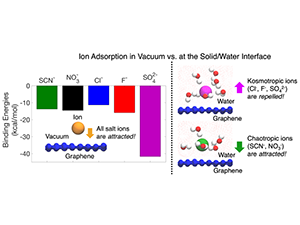Uncovering a Universal Molecular Mechanism of Salt Ion Adsorption at Solid/Water Interfaces
 Langmuir 2021, 37, 2, 722–733
Langmuir 2021, 37, 2, 722–733
Rahul Prasanna Misra and Daniel Blankschtein
The abstract reads as follows: Solid/water interfaces, in which salt ions come in close proximity to solids, are ubiquitous in nature. Because water is a polar solvent and salt ions are charged, a long-standing puzzle involving solid/water interfaces is how do the electric fields exerted by the salt ions and the interfacial water molecules polarize the charge distribution in the solid and how does this polarization, in turn, influence ion adsorption at any solid/water interface. Here, using state-of-the-art polarizable force fields derived from quantum chemical simulations, we perform all-atomistic molecular dynamics simulations to investigate the adsorption of various ions comprising the well-known Hofmeister series at the graphene/water interface, including comparing with available experimental data. Our findings reveal that, in vacuum, the ionic electric field-induced polarization of graphene results in a significantly large graphene–ion polarization energy, which drives all salt ions to adsorb to graphene. On the contrary, in the presence of water molecules, we show that the ions and the water molecules exert waves of molecular electric fields on graphene which destructively interfere with each other. This remarkable phenomenon is shown to cause a water-mediated screening of more than 85% of the graphene–ion polarization energy. Finally, by investigating superhydrophilic and superhydrophobic model surfaces, we demonstrate that this phenomenon occurs universally at all solid/water interfaces and results in a significant weakening of the ion–solid interactions, such that ion specific effects are governed primarily by a competition between the ion–water and water–water interactions, irrespective of the nature of the solid/water interface.
R.P.M. and D.B. acknowledge the financial support received as part of the Center for Enhanced Nanofluidic Transport (CENT), an Energy Frontier Research Center funded by the U.S. Department of Energy, Office of Science, Basic Energy Sciences under Award DE-SC0019112.
